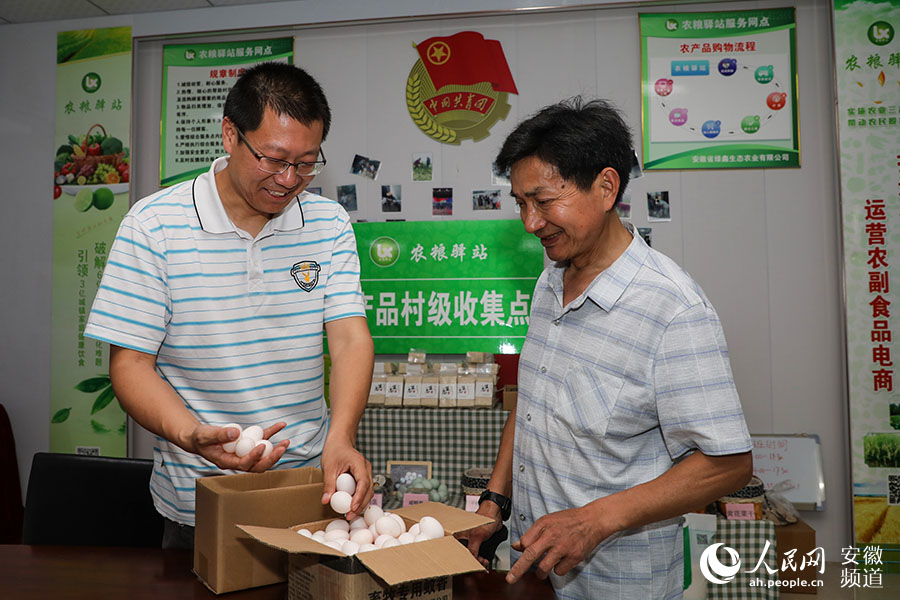

 |
| A villager from Guzhen county (right) sends pigeon eggs to an agricultural station, hoping to sell them through e-commerce. |
Bengbu city, of east China's Anhui province, has achieved significant results in poverty alleviation through the development of industries such as industrial bases for vegetable plantation and production.
Over the past six years, the number of registered impoverished people in Bengbu has decreased from 134,900 in 2014 to 1,791. A total of 54,945 households, or 134,096 people, were lifted out of poverty, reducing the poverty rate from 5.03 percent in 2014 to 0.07 percent.
In 2016, all 88 villages were stricken by poverty; in 2017, Huaiyuan county was removed from the list of poverty-stricken counties, making it one of the first four counties in Anhui province to be lifted out of poverty.
In terms of building characteristic industries, Bengbu vigorously promotes poverty alleviation through industries. Relying on the industrial base for vegetable farming of 250,000 mu (or 16,666 hectares) at 60 vegetable production sites at or above the municipal level, the city has witnessed a steady increase in the income of 5,789 poor households.
Through the system of interfacing enterprises with poor households, the city has promoted the utilization of straw, building a total of 17 straw collection and storage centers to help the villages increase its collective income by 1.9 million yuan (about $272,000).
As policies have been introduced to support the cultivation of rice and fishery in the city, the per capita income of 159 poor households increased by 1,000 yuan (about $140), through the transfer of land and employment.
Bengbu proactively develops aquatic products and jobs in the peanut industry to help 68 poor households increase their income. At the same time, relying on the production base of modern animal husbandry and the dairy industry, the city has secured new jobs and increased the income of poor households.
 |

 Award-winning photos show poverty reduction achievements in NE China's Jilin province
Award-winning photos show poverty reduction achievements in NE China's Jilin province People dance to greet advent of New Year in Ameiqituo Town, Guizhou
People dance to greet advent of New Year in Ameiqituo Town, Guizhou Fire brigade in Shanghai holds group wedding
Fire brigade in Shanghai holds group wedding Tourists enjoy ice sculptures in Datan Town, north China
Tourists enjoy ice sculptures in Datan Town, north China Sunset scenery of Dayan Pagoda in Xi'an
Sunset scenery of Dayan Pagoda in Xi'an Tourists have fun at scenic spot in Nanlong Town, NW China
Tourists have fun at scenic spot in Nanlong Town, NW China Harbin attracts tourists by making best use of ice in winter
Harbin attracts tourists by making best use of ice in winter In pics: FIS Alpine Ski Women's World Cup Slalom
In pics: FIS Alpine Ski Women's World Cup Slalom Black-necked cranes rest at reservoir in Lhunzhub County, Lhasa
Black-necked cranes rest at reservoir in Lhunzhub County, Lhasa China's FAST telescope will be available to foreign scientists in April
China's FAST telescope will be available to foreign scientists in April